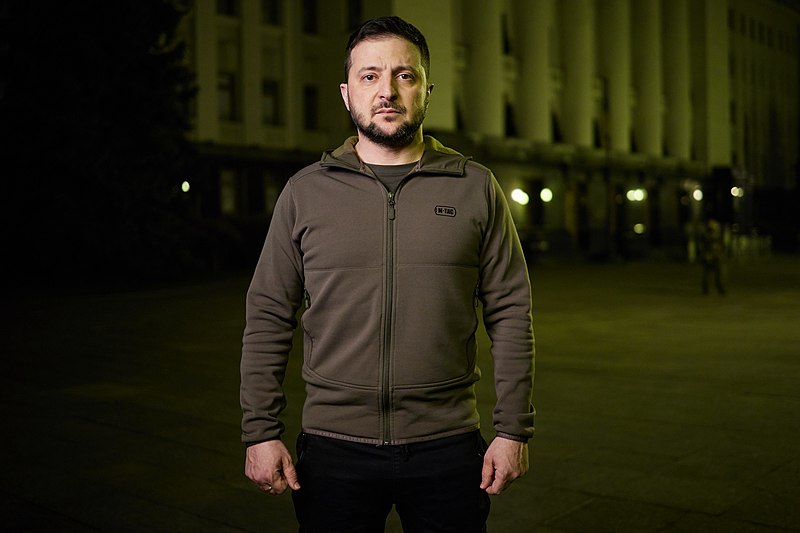Following the anticipation of an offensive in another region by Russian forces, Ukrainian President Volodymyr Zelenskyy has revealed that the offensive has begun. Authorities in Kyiv have already reported explosions coming from the front lines in the eastern region of Ukraine.
Zelenskyy said that the “Battle for Donbas” has commenced Monday, with a large part of the Russian forces focusing on this region of Ukraine. Donbas, which has been occupied by pro-Russian separatists, was one of the Ukrainian territories that Russian dictator Vladimir Putin recognized as independent states, sparking the war back in February.
The Kremlin declared during the past several weeks that its new goal was to capture Donbas following its failure to seize control of Ukraine’s capital Kyiv. In a video address, Zelenskyy vowed to fight back against Russia’s attempt to take control of any territory of Ukraine.
“No matter how many Russian troops are driven there, we will fight. We will defend ourselves. We will do it every day,” said Zelenskyy.
Zelenskyy’s chief of staff, Andriy Yermak, called Russia’s new offensive “the second phase of the war” and assured that Ukrainian forces are capable of resisting the attacks by Russians and pro-Russian separatists.
“This morning, almost along the whole front line of the Donetsk, Luhansk, and Kharkiv regions, the occupiers attempted to break through our defenses,” said Ukraine’s National Security Council Secretary Oleksiy Danilov. “Fortunately, our military is holding out. They passed through only two cities. This is Kreminna and another small town.”
“We are not giving up any territories,” said Danilov.
Meanwhile, the United Nations is set to debate a resolution that would require the five permanent members of the UN Security Council - the US, China, Russia, France, and the UK - to justify invoking their veto powers. The reform to the Security Council has often been called for in years but has gained support following Russia’s unprovoked invasion of Ukraine.
The five permanent members can veto any resolutions by the Security Council, but the 10 other members do not have veto power.
Russia has invoked its veto power in resolutions concerning its invasion of Ukraine, also vetoing the resolution that would call for Moscow to remove troops from Ukraine.



 Trump Backs Nexstar–Tegna Merger Amid Shifting U.S. Media Landscape
Trump Backs Nexstar–Tegna Merger Amid Shifting U.S. Media Landscape  Missouri Judge Dismisses Lawsuit Challenging Starbucks’ Diversity and Inclusion Policies
Missouri Judge Dismisses Lawsuit Challenging Starbucks’ Diversity and Inclusion Policies  New York Legalizes Medical Aid in Dying for Terminally Ill Patients
New York Legalizes Medical Aid in Dying for Terminally Ill Patients  U.S. Lawmakers to Review Unredacted Jeffrey Epstein DOJ Files Starting Monday
U.S. Lawmakers to Review Unredacted Jeffrey Epstein DOJ Files Starting Monday  South Korea Assures U.S. on Trade Deal Commitments Amid Tariff Concerns
South Korea Assures U.S. on Trade Deal Commitments Amid Tariff Concerns  Trump’s Inflation Claims Clash With Voters’ Cost-of-Living Reality
Trump’s Inflation Claims Clash With Voters’ Cost-of-Living Reality  Nighttime Shelling Causes Serious Damage in Russia’s Belgorod Region Near Ukraine Border
Nighttime Shelling Causes Serious Damage in Russia’s Belgorod Region Near Ukraine Border  US Pushes Ukraine-Russia Peace Talks Before Summer Amid Escalating Attacks
US Pushes Ukraine-Russia Peace Talks Before Summer Amid Escalating Attacks  U.S. to Begin Paying UN Dues as Financial Crisis Spurs Push for Reforms
U.S. to Begin Paying UN Dues as Financial Crisis Spurs Push for Reforms  Japan Election 2026: Sanae Takaichi Poised for Landslide Win Despite Record Snowfall
Japan Election 2026: Sanae Takaichi Poised for Landslide Win Despite Record Snowfall  Norway Opens Corruption Probe Into Former PM and Nobel Committee Chair Thorbjoern Jagland Over Epstein Links
Norway Opens Corruption Probe Into Former PM and Nobel Committee Chair Thorbjoern Jagland Over Epstein Links  Trump Allegedly Sought Airport, Penn Station Renaming in Exchange for Hudson River Tunnel Funding
Trump Allegedly Sought Airport, Penn Station Renaming in Exchange for Hudson River Tunnel Funding  Trump Says “Very Good Talks” Underway on Russia-Ukraine War as Peace Efforts Continue
Trump Says “Very Good Talks” Underway on Russia-Ukraine War as Peace Efforts Continue  Pentagon Ends Military Education Programs With Harvard University
Pentagon Ends Military Education Programs With Harvard University  China Warns US Arms Sales to Taiwan Could Disrupt Trump’s Planned Visit
China Warns US Arms Sales to Taiwan Could Disrupt Trump’s Planned Visit  Trump Allows Commercial Fishing in Protected New England Waters
Trump Allows Commercial Fishing in Protected New England Waters  TrumpRx.gov Highlights GLP-1 Drug Discounts but Offers Limited Savings for Most Americans
TrumpRx.gov Highlights GLP-1 Drug Discounts but Offers Limited Savings for Most Americans 































